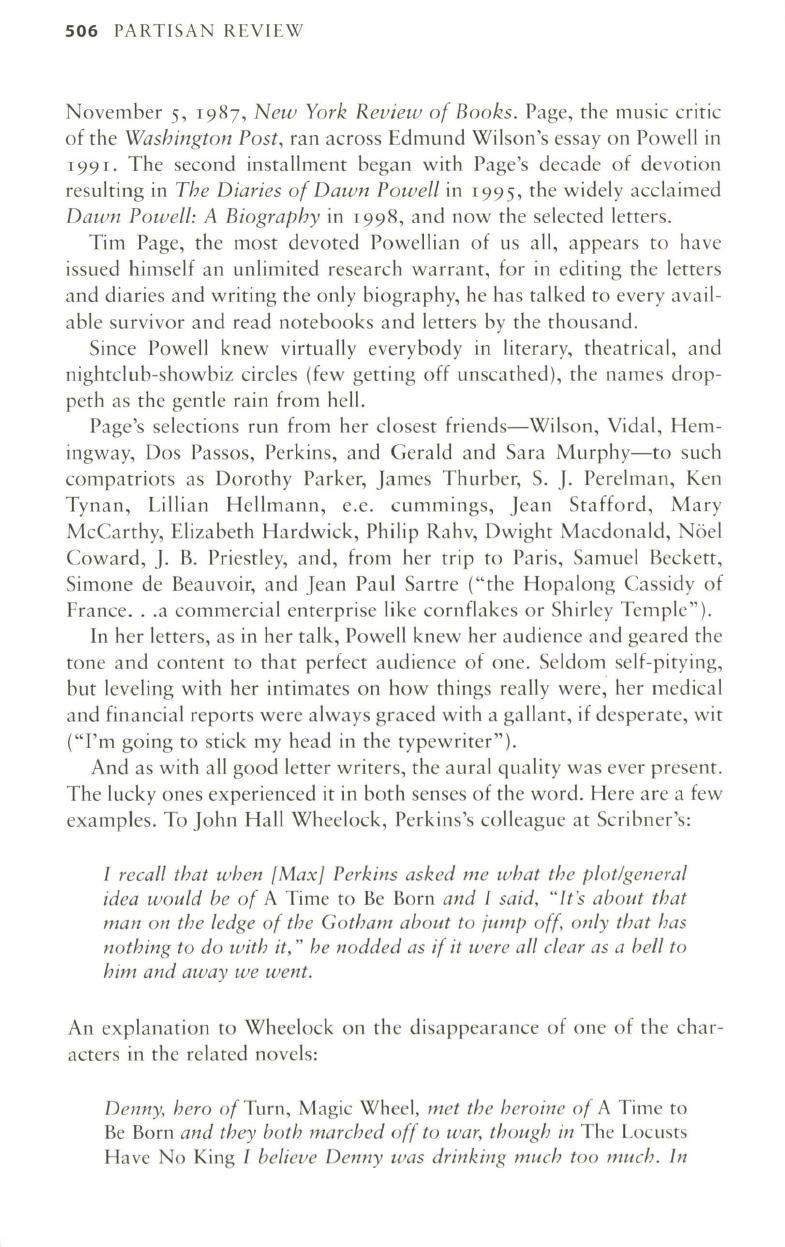
506
PARTISAN REVIEW
November
5, 1987,
New York Review of Books.
Page, the music critic
of the
Washington Post,
ran across Edmund Wilson's essay on Powell in
T991.
The second installment began with Page's decade of devotion
resulting in
The Diaries of Dawn Powell
in
1995,
the widely acclaimed
Dawn Powell: A Biography
in
1998,
and now the selected letters.
Tim Page, the most devoted Powellian of us all, appears to have
issued himself an unlimited research warrant, for in editing the letters
and diaries and writing the only biography, he has talked to every avail–
able survivor and read notebooks and letters by the thousand.
Since Powell knew virtually everybody in literary, theatrical, and
nightclub-showbiz circles (few getting off unscathed), the names drop–
peth as the gentle rain from hell.
Page's selections run from her closest friends-Wilson, Vidal, Hem–
ingway, Dos Passos, Perkins, and Gerald and Sara Murphy-to such
compatriots as Dorothy Parker, James Thurber, S. J. Perelman, Ken
Tynan, Lillian Hellmann, e.e. cummings, Jean Stafford, Mary
McCarthy, Elizabeth Hardwick, Philip Rahv, Dwight Macdonald, Noel
Coward,
J.
B. Priestley, and, from her trip to Paris, Samuel Beckett,
Simone de Beauvoir, and Jean Paul Sartre ("the Hopalong Cassidy of
France...a commercial enterprise like cornflakes or Shirley Temple").
In her letters, as in her talk, Powell knew her audience and geared the
tone and content to that perfect audience of one. Seldom self-pitying,
but leveling with her intimates on how things really were; her medical
and financial reports were always graced with a gallant, if desperate, wit
("I'm going to stick my head in the typewriter").
And as with all good letter writers, the aural quality was ever present.
The lucky ones experienced it in both senses of the word. Here are a few
examples. To John Hall Wheelock, Perkins's colleague at Scribner's:
I recall that when [Max} Perkins asked me what the plot/general
idea would be of
A Time to Be Born
and I said, "It's about that
man on the ledge of the Gotham about to jump off, only that has
nothing to do with it," he nodded as if it were all clear as a bell to
him and away we went.
An explanation to Wheelock on the disappearance of one of the char–
acters in the related novels:
Denny, hero of
Turn, Magic Wheel,
met the heroine of
A Time to
Be Born
and they both marched off to war, though in
The Locusts
Have No King
I believe Denny was drinking much too much. In


